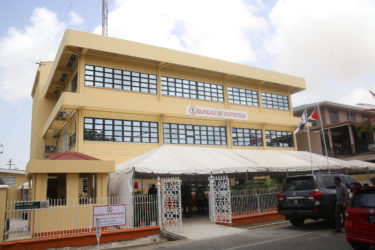President David Granger yesterday called for data centres in all ministries as part of the government’s thrust to use statistics to guide policy and decision-making as well as improve efficiency.
“We need to establish a data planning unit in each of our 15 ministries. We are committed to institutional strengthening by providing more training, by recruiting staff to work in the bureau and to work in the statistical unit in the various ministries,” Granger said.
The president was at the time delivering an address at the opening of the Bureau of Statistics’ new headquarters located on Main Street, Georgetown, in the former Customs House building.
Emphasising the importance of empirical data collection and analysis on a country’s holistic development, he promised government’s support in ensuring there is not only adequate training in the area but state-of-the-art technologies.

“My government is committed to preserving the culture that emphasises the importance of the collection, compilation and dissemination of reliable and relevant statistics at all levels,” Granger stated.
“We will ensure also that the statistical sections are aligned to the IT sections of the ministries so that data on their work for use by management and policy makers can be gathered, compiled and stored,” he added.
Some $160M went into transforming the old Customs House to a facility able to permanently accommodate the three departments that make up the Bureau and which were housed separately.
Granger informed that plans for a permanent office for the Bureau were on his agenda prior to the coalition winning office in May, 2015. The APNU+AFC’s ascension to office only quickened plans for the finding of a permanent home for the Bureau and for the rolling out of development plans.
The president said that the Bureau will now play an integral part in his government’s policy-making on a wide range of economic, population, environmental and social issues.
However, while he stressed the benefits of data gathering and analysis for his own government, he underscored the importance of its use for all stakeholders. It is to this end that he underlined the importance of the Bureau providing accurate, comprehensive and reliable statistics to public and private users.
“Good governance requires good statistics. Good governance is associated with transparency and accountability in policy making and these in turn rely on accurate and reliable and timely statistics. Government agencies, private sector and civil society need accurate and reliable and timely statistics in order to be able to make informed decisions. Statistics take the guess work out of decision making. They allow for analysis to be made on the basis of empirical evidence. They provide information and they validate or invalidate policy measures. They help to determine the choices upon which policy makers would make their decision. The absence of empirical data could put policies at the risk of being misaligned, misplaced or simple mistaken. Statistics would help us to better design policies; policies which are geographic or demographic-specific to illustrate differences across our regions and allows us to determine the social and economic impact of our policies,” the president stated.
“They help government agencies, the private sector and civil society in their programme formulation. Statistics will help the country to monitor progress in social programmes. The capacity to generate social statistics on poverty, unemployment and income distribution would allow us to determine our progress in implementing measures needed to achieve UN SDGs [Sustainable Development Goals] and enable citizens to judge the success of government policies and be the basis of making decisions and holding the government accountable,” he added.
The president pointed out that with Guyana having the capacity to provide sound statistics on a range of areas, the decision-making of local and foreign persons, businesses, governments and organisations, among others, will be void of anecdotal and emotive influences and thus all will be able to identify viable opportunities and potential risks.
He charged the Bureau to not be a mere generator of information but to work towards being able to provide to provide data and analysis for a range of stakeholders.
Minister of Finance Winston Jordan and Chief Statistician of the Bureau Lennox Benjamin both welcomed the permanent office for the Bureau after lamenting the struggles in moving between multiple buildings over the years.





